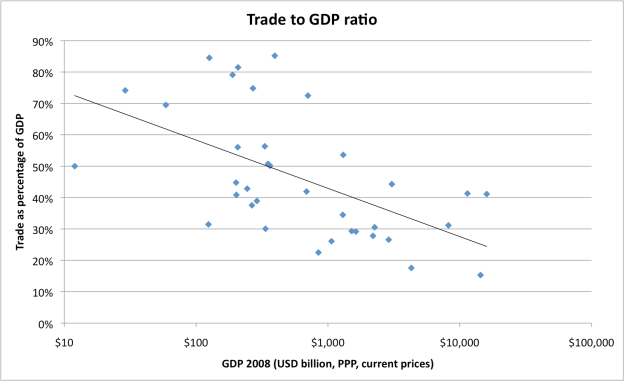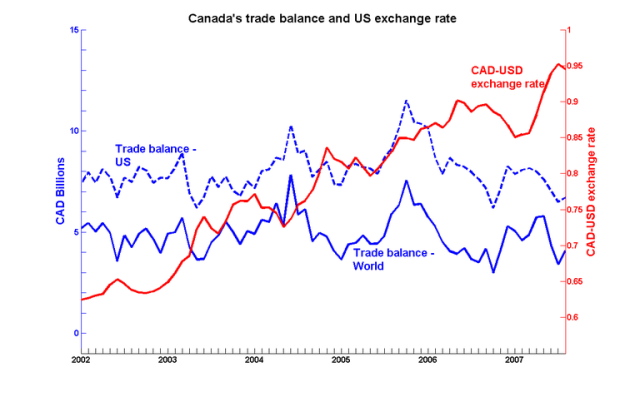by Jaime Bravo - jbravo@beneficiomarginal.com
Bennet McCallum was a reputed economist who highlighted some of the biggest questions in the economics field. Many of his questions still need to be resolved. It is the case of the gravity puzzle and the equations needed to solve the border puzzle. In the international trade literature, the border puzzle refers to the phenomena committed to study how borders participate of global trade - in the classical scenario, free trade. This theory has been developed by many economists. However, I decided to bring it to here as a part of the McCallum model because of the relevance of a paper published by Professor Anderson from Boston College and by Professor Van Wincoop from the University of Virginia - see references. The authors present that the McCallum model, based on the border puzzle, has some good points. Firstly, it correlates bilateral trade with GDP (Image 1) and with distance and other relevant factors for trade. They take into account, too, the commercial barriers established by modern states.
Furthermore, this model has been used to observe the effects of commercial activities in different unions - e.g. monetary unions. The theory explained by McCallum said that the bilateral commercial activities between two regions depend on the output of both, its distance and the possible separation between them by a border.

McCallum talks about the importance of doing research about the impact of barriers in global trade. However, some of his equations are far from being ideal. His ceteris paribus has two factors that can explain why it [research] could improve. Firstly, because his estimations are based on a regression that omits variables. The magnitude of his ratios reflects the small size of some economies (in this case, both authors speak about the Canadian economy, which is an open and a small one (please, understand this as a relative approach, because, certainly, CAN trades with a big part of the world; image 2). Its regression indicated that trade between it and USA is only 1.5 times the trade between States and provinces. The reason is that there is a little trade barrier between Canada and the rest of the world that provokes a big effect on the commercial resistances of any country) We conclude that trade between states don't increase due to this borders.

What McCallum proposes is the next equation:

Furthermore, this model has been used to observe the effects of commercial activities in different unions - e.g. monetary unions. The theory explained by McCallum said that the bilateral commercial activities between two regions depend on the output of both, its distance and the possible separation between them by a border.

McCallum talks about the importance of doing research about the impact of barriers in global trade. However, some of his equations are far from being ideal. His ceteris paribus has two factors that can explain why it [research] could improve. Firstly, because his estimations are based on a regression that omits variables. The magnitude of his ratios reflects the small size of some economies (in this case, both authors speak about the Canadian economy, which is an open and a small one (please, understand this as a relative approach, because, certainly, CAN trades with a big part of the world; image 2). Its regression indicated that trade between it and USA is only 1.5 times the trade between States and provinces. The reason is that there is a little trade barrier between Canada and the rest of the world that provokes a big effect on the commercial resistances of any country) We conclude that trade between states don't increase due to this borders.

What McCallum proposes is the next equation:

Where xij are the exports from i to j; yi and yj are the PIB of those regions, i and j; dij is the distance between i and j; δij is a variable with a value of 1 for international activities and of 0 for state-provincial activities.
The authors show some conclusions. The first one is that there is an important trade barrier in Canada because inter-provincial trade is 16.4 the state-provincial trade. Secondly, the borders of USA are much more less than the ones of Canada - please, consider it as economic-effects-problems. Thirdly, all the results are similar when data is contrasted. Finally, the border coefficient is similar when there are unit rates of income tax. Due to this, the regression gets more complexity and this is what the authors show:


The authors show some conclusions. The first one is that there is an important trade barrier in Canada because inter-provincial trade is 16.4 the state-provincial trade. Secondly, the borders of USA are much more less than the ones of Canada - please, consider it as economic-effects-problems. Thirdly, all the results are similar when data is contrasted. Finally, the border coefficient is similar when there are unit rates of income tax. Due to this, the regression gets more complexity and this is what the authors show:

Being REM:

Conclusions
This kind of literature can be a bit complicated. In fact, it is. The trade literature is getting more and more complex because it has to attend unpredictable events. Furthermore one of the "new things" inside trade is the globalization and the impact of it in non-developed economies. We have to do more research on this. When there is a non-fair trade situation, countries are doomed to failure. Globalization benefits to producer countries and harms the non developed ones because a) theory says that between two homogeneous products with the same characteristics the cheaper one will be the most consumed. Normally, only developed economies can achieve economies of scale, b) the opening of the economies (that is, the contrary of autarchy) can significantly reduce the commercial barriers that can provoke a fall in the commercial activity because those countries aren't competitive enough to compete with (same) products with the same or even cheaper prices.
References


0 comments:
Post a Comment
Hi there!
We'd love it if you'd share your thoughts and ideas. Don't forget to check back after commenting because we try to reply to all of your comments.
Just remember to be nice, please!
:)